

John Perry Barlow. John Perry Barlow. We are creating a world where anyone, anywhere may express his or her beliefs, no matter how singular, without fear of being coerced into silence or conformity...
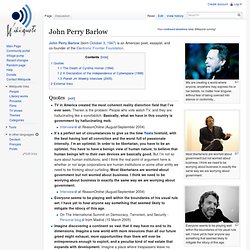
John Perry Barlow (born October 3, 1947) is an American poet, essayist, and co-founder of the Electronic Frontier Foundation. Quotes[edit] Most libertarians are worried about government but not worried about business. I think we need to be worrying about business in exactly the same way we are worrying about government. Everyone seems to be playing well within the boundaries of his usual rule set.
TV in America created the most coherent reality distortion field that I’ve ever seen. The Death of Cynthia Horner (1994)[edit] I have always felt that no matter how inscrutable its ways and means, the universe is working perfectly and working according to a greater plan than we can know. Thoughts on the life and death of his fiancée (April 1994) It didn't matter what we did or where we did it as long as we were together. Paul Hawken. Paul Hawken (born February 8, 1946, California) is an environmentalist, entrepreneur, and author.
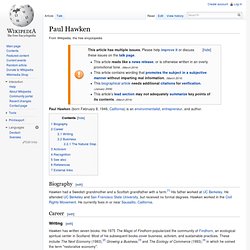
Biography[edit] Hawken had a Swedish grandmother and a Scottish grandfather with a farm.[1] His father worked at UC Berkeley. He attended UC Berkeley and San Francisco State University, but received no formal degrees. Hawken worked in the Civil Rights Movement. Pekka Himanen - Welcome - www.pekkahimanen.org. The worlds of DAVID BRIN. Michel Serres - 15 février 2011. Michel Serres. Inter-activ' : Michel Serres - 16 août 2013. Marc Prensky. Stewart Brand. Stewart Brand (born December 14, 1938) is an American writer, best known as editor of the Whole Earth Catalog.
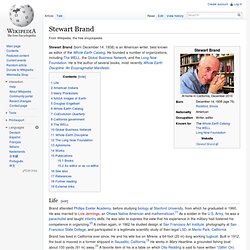
He founded a number of organizations, including The WELL, the Global Business Network, and the Long Now Foundation. He is the author of several books, most recently Whole Earth Discipline: An Ecopragmatist Manifesto. Life[edit] Brand attended Phillips Exeter Academy, before studying biology at Stanford University, from which he graduated in 1960.
He was married to Lois Jennings, an Ottawa Native American and mathematician.[1] As a soldier in the U.S. American Indians[edit] Through scholarship and by visiting numerous Indian reservations, he familiarized himself with the Native Americans of the West. Henry Jenkins. BRUCE E. LEVINE: www.brucelevine.net. Richard Stallman\'s Personal Page. Jopp_235.pdf (Objet application/pdf) Paul Virilio. Paul Virilio (born 1932) is a French cultural theorist and urbanist.

He is best known for his writings about technology as it has developed in relation to speed and power, with diverse references to architecture, the arts, the city and the military. Biography[edit] Since 1998, Virilio is only teaching intensive seminars at European Graduate School.[1] His latest projects involve working with homeless groups in Paris and building the first Museum of the Accident.
Theoretical arguments[edit] The war model[edit] Virilio's predictions about 'logistics of perception' - the use of images and information in war - (in War and Cinema, 1984) were so accurate that during the Gulf War he was invited to discuss his ideas with French military officers. The integral accident[edit] Virilio believes that technology cannot exist without the potential for accidents.
Dromology[edit] ‘Dromos’ is the Greek noun for road, but Virilio takes it to mean the activity of race (Virilio 1977:47). Yochai Benkler. Site officiel de Hubert Reeves. Hubert Reeves. Immanuel Wallerstein. Immanuel Maurice Wallerstein (New York City, September 28, 1930), is an American sociologist, historical social scientist, and world-systems analyst.
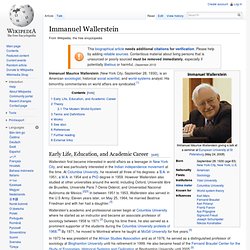
His bimonthly commentaries on world affairs are syndicated.[1] Immanuel Wallerstein. Immanuel Wallerstein. Un article de Wikipédia, l'encyclopédie libre.
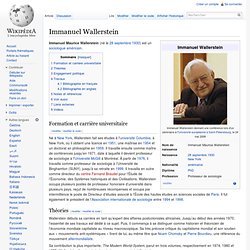
Immanuel Maurice Wallerstein (né le 28 septembre 1930) est un sociologue américain. Formation et carrière universitaire[modifier | modifier le code] Né à New York, Wallerstein fait ses études à l'université Columbia, à New York, où il obtient une licence en 1951, une maîtrise en 1954 et un doctorat en philosophie en 1959. Il travaille ensuite comme maître de conférences jusqu'en 1971, date à laquelle il devient professeur de sociologie à l'Université McGill à Montréal. À partir de 1976, il travailla comme professeur de sociologie à l’Université de Binghamton (SUNY), jusqu’à sa retraite en 1999.
Omidyar Group - Pierre and Pam Omidyar. Kevin Carson. Carson describes his politics as on "the outer fringes of both free market libertarianism and socialism.
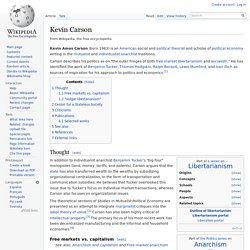
" He has identified the work of Benjamin Tucker, Thomas Hodgskin, Ralph Borsodi, Lewis Mumford, and Ivan Illich as sources of inspiration for his approach to politics and economics.[1] Thought[edit] In addition to individualist anarchist Benjamin Tucker's "big four" monopolies (land, money, tariffs, and patents), Carson argues that the state has also transferred wealth to the wealthy by subsidizing organizational centralization, in the form of transportation and communication subsidies. He believes that Tucker overlooked this issue due to Tucker's focus on individual market transactions, whereas Carson also focuses on organizational issues.
Free markets vs. capitalism[edit] Carl Sagan. Carl Edward Sagan (/ˈseɪɡən/; November 9, 1934 – December 20, 1996) was an American astronomer, cosmologist, astrophysicist, astrobiologist, author, science popularizer, and science communicator in astronomy and other natural sciences.
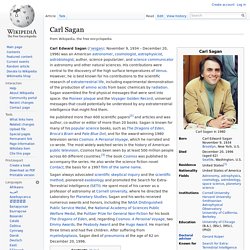
His contributions were central to the discovery of the high surface temperatures of Venus. However, he is best known for his contributions to the scientific research of extraterrestrial life, including experimental demonstration of the production of amino acids from basic chemicals by radiation. Sagan assembled the first physical messages that were sent into space: the Pioneer plaque and the Voyager Golden Record, universal messages that could potentially be understood by any extraterrestrial intelligence that might find them.
Sagan always advocated scientific skeptical inquiry and the scientific method, pioneered exobiology and promoted the Search for Extra-Terrestrial Intelligence (SETI). Andrey Korotayev. Andrey Korotayev (Russian: Андре́й Вита́льевич Корота́ев; born 1961) is a Russian anthropologist, economic historian, and sociologist, with major contributions to world-systems theory, cross-cultural studies, Near Eastern history, Big History, and mathematical modeling of social and economic macrodynamics.
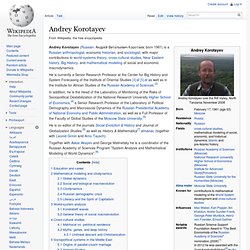
He is currently a Senior Research Professor at the Center for Big History and System Forecasing of the Institute of Oriental Studies [4] [5] as well as in the Institute for African Studies of the Russian Academy of Sciences.[3] The Carl Sagan Portal.